How Personal Finance Books Can Change Your Financial Future
Oh, the world of personal finance books—there’s no shortage of options! In the quest for financial literacy, one might feel lost amid the sea of resources. That’s where I come in, having spent countless hours reading, learning, and applying the wisdom from various personal finance books.
Let me take you on a journey through the must-read books that have had a lasting impact on my financial life. From understanding the essentials to navigating investment strategies, these books are your ticket to financial success. The benefits of diving into these resources are immense, including achieving financial freedom, growing your wealth, and making well-informed decisions that secure your future.
You know what they say, experience is the best teacher. I still remember that time when I made a rookie mistake and bought a timeshare. In hindsight, it was a costly lesson. But, boy, did it propel me to learn more about personal finance! Now, I can confidently navigate the financial world, and I want to share that knowledge with you. So buckle up, and let’s embark on this exciting journey together!
Importance of reading finance books
Here are the key points for the importance of reading finance books:
- Financial education: Finance books provide essential knowledge for managing money effectively and making informed decisions.
- Healthy money habits: Reading finance books can help cultivate responsible spending, saving, and investing habits.
- Achieving financial goals: Learning about financial concepts and strategies can help achieve short-term and long-term financial goals.
- Avoiding financial mistakes: Finance books can help avoid common financial pitfalls and costly mistakes.
- Building wealth: Finance books offer insights into wealth-building strategies, such as investing and passive income sources.
- Adapting to changes: Finance books can help you stay informed and adapt to changes in the financial landscape.
- Empowerment and independence: Financial literacy leads to increased self-confidence and independence.
Criteria used in the selection of these books
When selecting the personal finance books mentioned in the above list, we considered several important criteria to ensure that these books are valuable, informative, and actionable for our readers. Here are the key criteria we used:
- Relevance and applicability: The books provide practical and actionable advice for various financial situations and cater to different financial goals and stages of life.
- Expertise and credibility: The books were written by renowned authors with a strong background in personal finance, investing, or entrepreneurship, demonstrating their expertise and credibility.
- Popularity and impact: The books have received positive reviews, been bestsellers, or have a strong following, indicating their impact and popularity among readers.
- Accessibility and readability: The books are written in a clear, engaging, and easy-to-understand manner, making them accessible to a wide audience.
Best Finance Books Overall
1. Rich Dad Poor Dad by Robert T. Kiyosaki
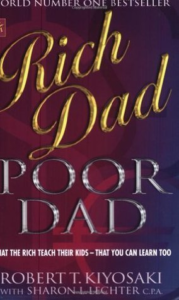
Best quote from the book: “The only difference between a rich person and a poor person is how they use their time.”
Why you should read it: Rich Dad Poor Dad is a groundbreaking book that has helped millions of readers worldwide reshape their understanding of money and wealth creation. The book shares the story of the author’s two fathers—his real father (poor dad) and his best friend’s father (rich dad). The contrasting financial lessons from each offer readers a unique perspective on money management, investments, and personal finance. Robert Kiyosaki illustrates how the mindset and strategies of the “rich dad” can lead to financial success, and the book serves as an excellent starting point for anyone looking to build a strong financial foundation.
Key takeaways:
- The importance of financial education and its role in wealth creation
- The difference between assets and liabilities and how to leverage assets to generate income
- The significance of building passive income streams to achieve financial freedom
- The value of entrepreneurship and the mindset required to create wealth
- The drawbacks of traditional employment and the limitations it can impose on financial growth
2. Money: Master The Game by Tony Robbins
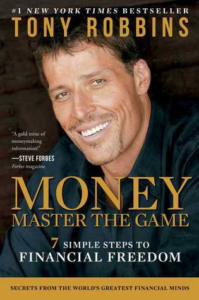
Best quote from the book: “Remember: we are drowning in information, but we’re starving for wisdom.”
Why you should read it: Money: Master The Game is a comprehensive guide to mastering personal finance and investing. Based on interviews with some of the world’s most successful investors, such as Warren Buffett and Ray Dalio, Tony Robbins shares valuable insights into the strategies used by these financial gurus. The book provides actionable steps to achieve financial freedom and offers a wealth of knowledge suitable for beginners and experienced investors alike.
Key takeaways:
- The psychology of wealth creation and the importance of adopting a positive money mindset
- The importance of understanding investment fees and their long-term impact on returns
- Diversification and asset allocation strategies to manage risk and optimize returns
- The power of compounding and long-term investing and how they contribute to wealth accumulation
- Retirement planning strategies and the role of tax-advantaged investment vehicles
3. The Richest Man in Babylon by George S. Clason
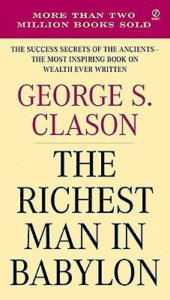
Best quote from the book: “Advice is one thing that is freely given away, but watch that you take only what is worth having.”
Why you should read it: The Richest Man in Babylon is a timeless classic that imparts ancient Babylonian wisdom on wealth-building through engaging parables. The book shares the story of Arkad, the richest man in Babylon, and presents simple yet effective principles for financial success. The lessons in this book are as relevant today as they were thousands of years ago, providing readers with a roadmap to achieving financial abundance.
Key takeaways:
- The 7 Cures for a Lean Purse—principles for wealth accumulation, including saving, investing, and budgeting
- The importance of paying yourself first by setting aside a portion of your income for savings and investments
- The value of seeking advice from those who have achieved financial success and learning from their experiences
- The power of investing wisely and patiently, focusing on long-term growth rather than short-term gains
- The benefits of acquiring skills and knowledge to increase your earning potential
Best Finance Books For Beginners
4. The Barefoot Investor by Scott Pape
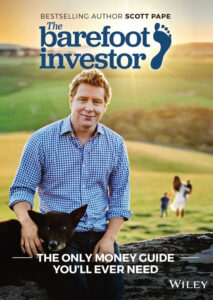
Best quote from the book: “You don’t have to be rich to invest, but you have to invest to get rich.”
Topics included in the book:
- Saving and budgeting
- Debt management
- Superannuation and retirement planning
- Insurance
- Property and stock market investing
Why you should read it: The Barefoot Investor is a no-nonsense, easy-to-understand guide to personal finance that breaks down complex financial concepts into practical, actionable steps. It provides a straightforward roadmap to financial success, making it an excellent choice for beginners looking to take control of their finances and achieve financial freedom.
Key takeaways:
- The importance of creating a solid financial plan
- Strategies for paying off debt and building an emergency fund
- Tips for optimizing your superannuation and retirement savings
- Understanding the role of insurance in your financial plan
- How to invest in property and the stock market for long-term growth
Analogy: Reading The Barefoot Investor is like having a wise financial mentor by your side, guiding you step-by-step on the path to financial success.
5. The One-Page Financial Plan by Carl Richards
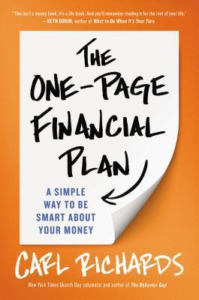
Best quote from the book: “The purpose of a financial plan isn’t to predict the future; it’s to make the best decisions we can in the face of uncertainty.”
Topics included in the book:
- Goal setting and financial planning
- Saving and investing
- Risk management
- Retirement planning
- Behavioral finance
Why you should read it: The One-Page Financial Plan is a simple yet powerful guide to creating a personalized financial plan that aligns with your goals and values. By focusing on what matters most, the book provides readers with the tools to make smart financial decisions and achieve their dreams.
Key takeaways:
- The importance of identifying your personal financial goals and values
- How to create a one-page financial plan that serves as a roadmap for success
- Strategies for managing risk and making informed investment decisions
- Tips for navigating the emotional aspects of personal finance
- The role of ongoing financial planning in achieving your goals
Analogy: Reading The One-Page Financial Plan is like having a GPS for your financial journey, helping you navigate the twists and turns of your path to financial success.
6. Your Money or Your Life by Vicki Robin and Joe Dominguez
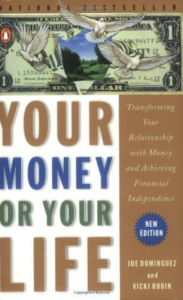
Best quote from the book: “Money is something we choose to trade our life energy for.”
Topics included in the book:
- Relationship with money
- Financial independence
- Conscious spending
- Savings and investing
- Redefining work and retirement
Why you should read it: Your Money or Your Life is a transformative book that challenges readers to reassess their relationship with money and redefine what it means to be financially successful. It provides a comprehensive nine-step program for achieving financial independence, offering practical tools and strategies for managing money mindfully.
Key takeaways:
- Understanding the true cost of your spending in terms of life energy
- How to track your income and expenses to gain control of your finances
- Strategies for reducing spending and increasing savings
- Tips for creating a passive income stream through investing
- Redefining the concept of work and retirement to align with your values and goals
Analogy: Reading Your Money or Your Life is like embarking on a journey of self-discovery, where you learn to align your financial decisions with your values and aspirations, ultimately leading to a richer and more fulfilling life.
Best Finance Books For Investors
7. The Intelligent Investor by Benjamin Graham
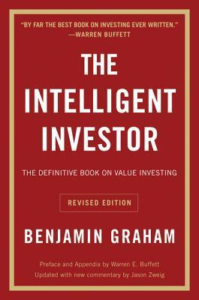
Best quote from the book: “In the short run, the market is a voting machine, but in the long run, it is a weighing machine.”
Topics included in the book:
- Value Investing
- Security analysis
- Stock selection
- Bonds and preferred stocks
- Margin of safety
Why you should read it and the author’s history: The Intelligent Investor is considered one of the best investing books of all time and has been a cornerstone of value investing since its publication in 1949. Benjamin Graham, the author and the “father of value investing,” was a professor of finance at Columbia Business School and mentored some of the most successful investors, including Warren Buffett. This book is a must-read for anyone interested in understanding the principles of value investing and developing a long-term, disciplined approach to building wealth through the stock market.
Key takeaways:
- The importance of a disciplined, long-term investment approach
- The principles of value investing and how to identify undervalued stocks
- The difference between investing and speculating
- How to analyze stocks based on their financial fundamentals
- The concept of margin of safety and its role in minimizing risk
8. The Little Book That Beats The Market by Joel Greenblatt

Best quote from the book: “The secret to investing is that there is no secret to investing. Every important aspect of value investing has been made available to the public many times over, beginning in 1934 with the first edition of Security Analysis.”
Topics included in the book:
- Magic Formula Investing
- Stock selection
- Market efficiency
- Long-term investing
- Behavioral finance
Why you should read it: The Little Book That Beats The Market presents a simple yet effective strategy known as the “Magic Formula,” which combines high-quality stocks with low valuations to consistently outperform the market. Joel Greenblatt, a successful hedge fund manager and professor at Columbia Business School, provides readers with a straightforward approach to investing that is suitable for both beginners and experienced investors.
Key takeaways:
- The principles of the Magic Formula and its role in stock selection
- How to identify high-quality companies at a bargain price
- The importance of discipline and patience in successful investing
- The role of human behavior in market efficiency and stock prices
- The benefits of a long-term investment horizon
9. A Random Walk Down Wall Street by Burton G. Malkiel
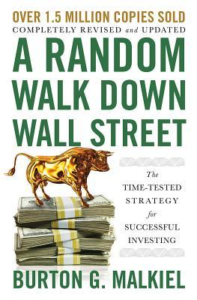
Best quote from the book: “The investor’s chief problem—and even his worst enemy—is likely to be himself.”
Topics included in the book:
- Efficient market hypothesis
- Portfolio management
- Asset allocation
- Index investing
- Behavioral finance
Why you should read it: A Random Walk Down Wall Street is a classic investing book that explores the concept of the efficient market hypothesis and its implications for individual investors. Burton G. Malkiel, a renowned economist and professor at Princeton University, provides readers with an in-depth understanding of various investment strategies and the importance of a disciplined, diversified approach to portfolio management. The book is an essential read for anyone looking to build a solid foundation in investing and navigate the unpredictable world of the stock market.
Key takeaways:
- The principles of the efficient market hypothesis and its impact on investing strategies
- The importance of diversification and asset allocation in portfolio management
- The benefits of index investing and the rise of low-cost index funds
- The role of human behavior and emotions in driving market fluctuations
- The advantages of a long-term, disciplined approach to investing
Best Finance Books For Entrepreneurs
10. The Millionaire Fastlane by MJ DeMarco
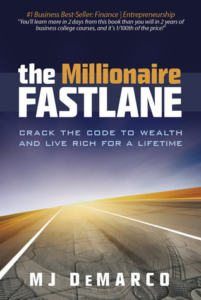
Best quote from the book: “The road you travel (the Fastlane, the Slowlane, or the Sidewalk) is influenced by how you think about money, wealth, and rich people.”
Topics included in the book:
- Wealth creation
- Passive income streams
- Time and money relationship
- Entrepreneurship mindset
- Financial freedom
Why you should read: The Millionaire Fastlane is a groundbreaking book that challenges conventional wisdom about wealth creation and offers a roadmap to financial success through entrepreneurship. Published in 2011 by MJ DeMarco, a self-made millionaire, and entrepreneur, this book has sold hundreds of thousands of copies worldwide. DeMarco shares his insights and experiences, urging readers to break free from the traditional 9-to-5 mindset and embrace the fast lane to wealth creation and financial freedom.
Key takeaways:
- The difference between the Fastlane, Slowlane, and Sidewalk approaches to wealth creation
- How to leverage passive income streams for accelerated wealth accumulation
- The importance of time as a critical resource in wealth building
- The mindset shift required to embrace entrepreneurship and create value
- Strategies for achieving financial freedom and living life on your own terms
Analogy: Reading The Millionaire Fastlane is like getting behind the wheel of a high-performance sports car, accelerating your journey to financial freedom, and leaving the slow lane of traditional wealth-building strategies in the dust.
11. Think and Grow Rich by Napoleon Hill
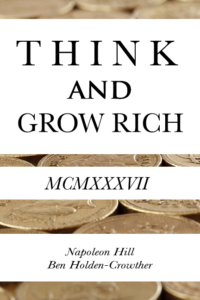
Best quote from the book: “Whatever the mind can conceive and believe, the mind can achieve.”
Topics included in the book:
- Success principles
- The power of the subconscious mind
- Goal setting and visualization
- Mastermind groups
- Overcoming adversity
Why you should read: Think and Grow Rich, published in 1937, is one of the best-selling self-help books of all time, with over 100 million copies sold worldwide. Napoleon Hill, a journalist and author conducted extensive research on the success habits of the wealthiest individuals of his time, including Andrew Carnegie and Henry Ford. This timeless classic reveals the 13 principles of success that have helped countless entrepreneurs achieve their dreams and build lasting wealth.
Key takeaways:
- The 13 success principles and their application to wealth creation
- The role of the subconscious mind in shaping our reality
- The power of goal setting, visualization, and affirmations
- The benefits of forming mastermind groups and surrounding yourself with like-minded individuals
- Strategies for overcoming adversity and turning obstacles into opportunities
12. Profit First by Mike Michalowicz
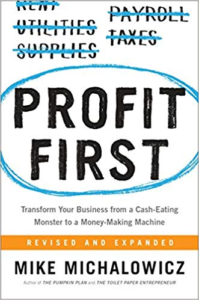
Best quote from the book: “Sales – Profit = Expenses.”
Topics included in the book:
- Cash flow management
- Financial discipline
- Business growth strategies
- Entrepreneurial mindset
- Financial goal setting
Why you should read this book: Profit First, published in 2014, is a revolutionary approach to managing your business’s finances and ensuring profitability from day one. Mike Michalowicz, a successful entrepreneur and author, shares his innovative system, which has been embraced by thousands of businesses worldwide. By flipping the traditional accounting formula and prioritizing profit, entrepreneurs can transform their businesses into cash-generating machines.
Key takeaways:
- The Profit First system and its impact on cash flow management
- The importance of financial discipline and establishing a habit of taking profit first
- Strategies for reducing expenses and optimizing business operations
- How to set financial goals and measure success in your business
- The mindset shift required to prioritize profitability and drive sustainable growth
Analogy: Reading Profit First is like having a seasoned financial advisor by your side, guiding you through a transformative process that turns your business into a well-oiled, profit-generating machine.
Best Finance Books For Saving Money
13. I Will Teach You To Be Rich by Ramit Sethi
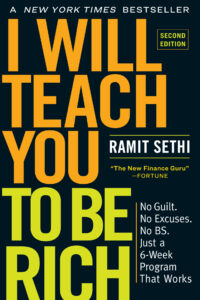
Best quote from the book: “Spend extravagantly on the things you love, and cut costs mercilessly on the things you don’t.”
Topics included in the book:
- Personal finance management
- Saving and investing
- Conscious spending
- Automation
- Credit optimization
Why you should read it and the author’s history, publication date, and copies sold: I Will Teach You To Be Rich, published in 2009, is a practical guide to mastering your personal finances and living a rich life. Ramit Sethi, a personal finance expert and entrepreneur has sold over 500,000 copies of the book. His no-nonsense approach to money management, coupled with a focus on enjoying the things you love, has resonated with a wide audience looking to take control of their finances.
Key takeaways:
- The importance of a proactive approach to personal finance
- Strategies for saving money and optimizing expenses
- The power of automating your finances to reduce stress and save time
- How to invest wisely and grow your wealth
- Techniques for improving your credit score and negotiating better deals
Analogy: Reading I Will Teach You To Be Rich is like attending a masterclass in personal finance, where you learn the secrets to living a life of financial abundance without sacrificing the things you love.
14. The Total Money Makeover by Dave Ramsey
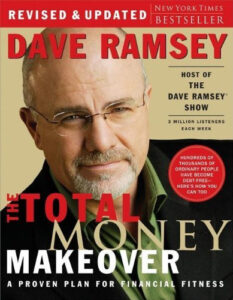
Best quote from the book: “You must walk to the beat of a different drummer. The same beat that the wealthy hear. If the beat sounds normal, evacuate the dance floor immediately! The goal is to not be normal because, as my radio listeners know, normal is broke.”
Topics included in the book:
- Debt elimination
- Emergency funds
- Budgeting
- Investing
- Retirement planning
Why you should read this book: The Total Money Makeover, published in 2003, is a comprehensive guide to achieving financial peace and stability. Dave Ramsey, a renowned personal finance expert, radio show host, and author, has sold over 5 million copies of the book. His step-by-step plan, known as the “Baby Steps,” has helped millions of people eliminate debt, build wealth, and secure their financial future.
Key takeaways:
- The 7 Baby Steps to financial peace and stability
- Strategies for eliminating debt using the debt snowball method
- The importance of building an emergency fund and living on a budget
- How to invest for the long term and plan for retirement
- The role of financial discipline and perseverance in achieving your goals
15. The Automatic Millionaire by David Bach
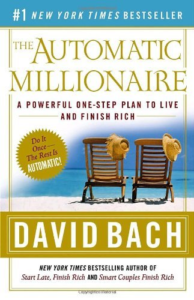
Best quote from the book: “The one thing that all financially successful people have in common is that they pay themselves first.”
Topics included in the book:
- Financial automation
- Saving and investing
- Retirement planning
- Homeownership
- Debt reduction
Why you should read: The Automatic Millionaire, published in 2004, is a bestselling book that reveals the secret to becoming a millionaire without relying on a budget or willpower. David Bach, a renowned personal finance expert, and author, has sold over 1.5 million copies of the book. His simple, effective strategies for automating your finances and building wealth over time have inspired millions to take control of their financial destiny.
Key takeaways
- The importance of paying yourself first and automating your savings
- Strategies for investing in your retirement and taking advantage of compound interest
- How to reduce debt and build equity in your home
- The power of “The Latte Factor” and making small, consistent changes to your spending habits
- The role of financial discipline in achieving long-term financial success
Best Finance Books For Retirement
16. The Millionaire Next Door by Thomas J. Stanley
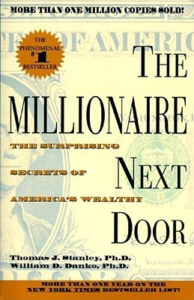
Best quote from the book: “Whatever your income, always live below your means.”
Topics included in the book:
- Wealth accumulation
- Frugality
- Financial independence
- Habits of millionaires
- Building net worth
Why you should read this book: The Millionaire Next Door, published in 1996, is a groundbreaking study of America’s millionaires and their habits. Thomas J. Stanley, a renowned researcher and author has sold over 3 million copies of the book. The book uncovers the surprising secrets of the wealthy and provides valuable insights into achieving financial success and independence.
Key takeaways:
- The importance of living below your means and practicing frugality
- The habits and traits of self-made millionaires
- Strategies for building wealth and net worth over time
- The role of financial education and discipline in achieving financial independence
- How to develop a millionaire mindset
17. The Simple Path to Wealth by J.L. Collins
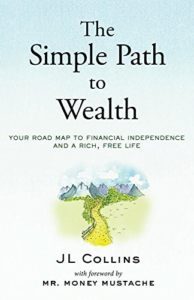
Best quote from the book: “The best time to plant a tree is twenty years ago. The second best time is now.”
Topics included in the book:
- Index investing
- Financial independence
- Retirement planning
- Savings and frugality
- Debt management
Why you should read this book: The Simple Path to Wealth, published in 2016, is a concise guide to achieving financial independence and retiring early (FIRE) through simple, effective investing strategies. J.L. Collins, a financial blogger and author has sold over 500,000 copies of the book. His straightforward approach to wealth building has resonated with readers seeking a clear, actionable path to financial freedom.
Key takeaways:
- The power of index investing and low-cost, passive investment strategies
- Strategies for achieving financial independence and retiring early
- The importance of saving and living frugally
- How to manage debt and avoid financial pitfalls
- The mindset shift required to prioritize financial freedom
Analogy: Reading The Simple Path to Wealth is like receiving a treasure map to financial independence, with clear directions and a proven path to follow.
Best Finance Books For Financial Freedom
18. Secrets Of The Millionaire Mind by T. Harv Eker
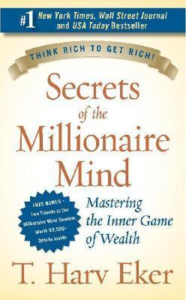
Best quote from the book: “Rich people believe ‘I create my life.’ Poor people believe ‘Life happens to me.'”
Topics included in the book:
- Wealth Mindset
- Financial habits
- Money management
- Personal development
- Entrepreneurship
Why you should read it and the author’s history: Secrets Of The Millionaire Mind, published in 2005, is a bestselling book that explores the mindset and habits of wealthy individuals. T. Harv Eker, a successful entrepreneur and personal development expert has sold over 1 million copies of the book. His teachings on mastering the inner game of wealth have transformed the lives of countless readers.
Key takeaways:
- The 17 wealth files that differentiate the rich from the poor
- Strategies for developing a millionaire mindset and cultivating successful habits
- The importance of financial education and personal development
- Techniques for managing money and building wealth
- The role of entrepreneurship in creating financial freedom
19. The 4-Hour Workweek by Timothy Ferriss
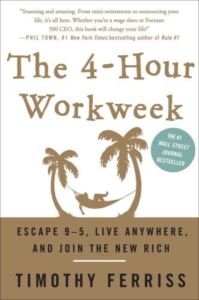
Best quote from the book: “Focus on being productive instead of busy.”
Topics included in the book:
- Lifestyle design
- Time management
- Passive income
- Outsourcing
- Entrepreneurship
Why you should read this book: The 4-Hour Workweek, published in 2007, is a revolutionary book that challenges conventional work and lifestyle norms. Timothy Ferriss, an entrepreneur, author, and lifestyle design expert, has sold over 2 million copies of the book. The 4-Hour Workweek has inspired a generation of people to pursue a more fulfilling and efficient approach to work, life, and wealth creation.
Key takeaways:
- The concept of lifestyle design and redefining success
- Strategies for maximizing productivity and time management
- Generating passive income and escaping the 9-to-5 grind
- The power of outsourcing and delegation in scaling businesses
- The importance of work-life balance and pursuing personal passions
Analogy: Reading The 4-Hour Workweek is like discovering a secret formula for living life on your own terms, breaking free from conventional constraints to achieve financial freedom and personal fulfillment.
Choosing the Right Personal Finance Book: Recap and Final Thoughts
In the vast ocean of personal finance books, it’s crucial to select the right resources that can truly propel you toward financial growth and success. By carefully curating a list of books in various categories, we’ve provided you with a solid foundation to build your financial knowledge.
We advise you to choose a book from each category that speaks to you in order to get the most out of these resources and begin developing your financial literacy. These publications have the ability to permanently alter your financial situation, give you priceless knowledge, and open the path to financial freedom.
Remember, every great journey starts with a single step, and by diving into these books, you’re taking that crucial first step toward mastering your personal finances and achieving your financial goals. Happy reading!
